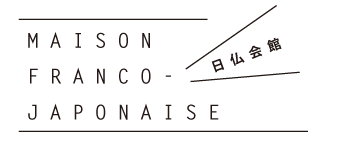février 2022
- Évolutions urbaines et représentations
- Reconsidering the International Expansion of the Arts and Culture in the Twentieth Century: Interculturality in the United States of America, France and Japan
- Séminaire doctoral
- The Evolvement of the EU-Japan Economic Partnership Agreement as Seen by the European Business Council
Évolutions urbaines et représentations
en français sans traduction
| samedi 05 février 2022 / 17 h - 19 h | |
| En ligne | |
| Etienne LOMBARD (architecte HMONP, praticien dans l'agence d'architecture parisienne PCA-STREAM), Giada RICCI (architecte, docteure en histoire de l’art, experte UNESCO pour les musées) |
|
Cette conférence se tiendra sur la plateforme Zoom. Merci de bien vouloir les entrer dans l'application Zoom afin de participer à l'événement. CLIQUER ICI POUR VOUS INSCRIRE Pour plus d'informations sur les modalités d'adhésion, veuillez consulter : https://support.zoom.us/hc/fr/articles/115004954946-Rejoindre-et-participer-%C3%A0-un-webinaire-participant- Musée d'art contemporain de la ville de Towada, Towadashi gendai bijutsukan 十和田市現代美術館. Ph Giada Ricci
17 h 10 « Jizoku kanōna kenchiku 持続可能な建築 : contextualisation, promotion et mise en œuvre de l'architecture durable au Japon » par Etienne LOMBARD (architecte HMONP, praticien dans l'agence d'architecture parisienne PCA-STREAM) 18 h « Gendai bijutsukan 現代美術館, spatialité du musée d'art contemporain au Japon : exemple du musée d'art contemporain de la ville de Towada, Towadashi gendai bijutsukan 十和田市現代美術館 » par Giada RICCI (architecte, docteure en histoire de l’art, experte UNESCO pour les musées). 18 h 50 En conclusion Organisation : JAPARCHI, réseau scientifique thématique des chercheurs francophones sur l'architecture, la ville et le paysage japonais, IFRJ-MFJ |
* À l'exception des séminaires fermés de recherche ou des événements exceptionnels requérant une inscription payante, l'accès aux manifestations de la MFJ est libre et gratuit. Prière de vous inscrire.
Reconsidering the International Expansion of the Arts and Culture in the Twentieth Century: Interculturality in the United States of America, France and Japan
en anglais sans traduction
| dimanche 06 février 2022 / 10:00–13:40 | |
| Online | |
| Ann Cooper ALBRIGHT, Ninotchka D. BENNAHUM, Judith CHAZIN-BENNAHUM, Thomas F. DEFRANTZ, HOSHINO Yukiyo, YAGISHITA Emi |
|
This conference will be held on the Zoom platform. After registering, you will receive a confirmation email containing information about joining the webinar.
Program: 10:00-10:10 (JST) Opening remarks 10:10-10:35 (JST) (EST:20:10-20:35) including 5mins Q&A 10:35-11:00 (JST) (EST:20:35-21:00) including 5mins Q&A 11:00-11:25 (JST) (MST:19:00-19:25) including 5mins Q&A 11:25-11:30 (JST) 5mins break 11:30-11:55 (JST) (PST: 18:30-18:55) including 5mins Q&A 11:55-12:20 (JST) including 5mins Q&A 12:20-12:45 (JST) including 5mins Q&A 12:45-12:50 (JST) 5mins break 12:50-13:30 (JST) (EST:22:50-23:30, MST:20:50-21:30,PST:19:50-20:30) 13:30-13:40 (JST) Closing remarks Moderators: YAGISHITA Emi (Waseda University, Société asiatique), Judith CHAZIN-BENNAHUM (University of New Mexico) Organizer: FRIJ-MFJ, JSPS Grant-in-Aid Young Scientists (A) 17H04770 "International Expansion of Art and Culture in the Twentieth Century" , Waseda University Support: Sciencescope |
* À l'exception des séminaires fermés de recherche ou des événements exceptionnels requérant une inscription payante, l'accès aux manifestations de la MFJ est libre et gratuit. Prière de vous inscrire.
| mardi 22 février 2022 / 18 h - 20 h (JST) | |
| En ligne |
* À l'exception des séminaires fermés de recherche ou des événements exceptionnels requérant une inscription payante, l'accès aux manifestations de la MFJ est libre et gratuit. Prière de vous inscrire.
The Evolvement of the EU-Japan Economic Partnership Agreement as Seen by the European Business Council
en anglais sans traduction
| mardi 22 février 2022 / 12:30–14:00 | |
| Online | |
| Bjorn KONGSTAD (European Business Council) |
|
This conference will be held on the Zoom platform. After registering, you will receive a confirmation email containing information about joining the webinar.
The European Business Council in Japan is a trade policy advocacy organisation representing European industry in Japan. It has been doing this for soon 50 years. Bjorn Kongstad will give a presentation on its activities with a focus on the EPA, including the preparation, and also on the EBC White Paper, an annual report on the Japanese regulatory environment. The EBC first presented the idea of a trade agreement between the EU and Japan in the mid 2000’s. While tariffs were high on agricultural products in Japan, industrial goods, which made up for most EU exports, were low, or even non-existing. Hence the EBC suggested an agreement where the focus would also be on NTBs/NTMs as a traditional FTA would not give the EU a substantial benefit. The second part of the presentation will be spent on the EBC White Paper, and some of its content. The White Paper is one of the tools that the EBC uses to advocate for improvements to the Japanese regulatory environment.
Profil:
|
* À l'exception des séminaires fermés de recherche ou des événements exceptionnels requérant une inscription payante, l'accès aux manifestations de la MFJ est libre et gratuit. Prière de vous inscrire.
Agenda du Bureau Français > février 2022










 Programme officiel des Ballets russes : Théâtre de l'Opéra, mai-juin 1920 [soirée du 8 mai 1920], BNF Gallica, domaine public.
Programme officiel des Ballets russes : Théâtre de l'Opéra, mai-juin 1920 [soirée du 8 mai 1920], BNF Gallica, domaine public.




